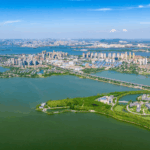In the sweltering heat of mid-August, Shu Yuefei, a farm machinery operator in Longzhu Village, Jinjiapu Town, Yingshan County, Huanggang City, carefully maintained his tools in his yard, not even bothering to wipe the sweat off his brow. Having just completed a skills training program in the city, he was full of energy: “My son’s wedding saved me 150,000 to 160,000 yuan, equivalent to two years of net income. I’m full of strength now and want to help my child buy a house in Wuhan!”
This sense of ease did not come easily. Shu Yuefei is 56 years old and farms over 200 mu of land in the village. With his skill in operating farm machinery, he earns 80,000 to 100,000 yuan a year, which is considered well-off locally. But at the beginning of this year, when his son was preparing to get married, a budget of 200,000 yuan for the bride price weighed heavily on his mind. “I only have one child, and marriage is a once-in-a-lifetime event. Even if I have to borrow money, I can’t lose face!”
After learning of the situation, Wang Liang, the Party branch secretary of Longzhu Village, immediately visited to offer advice: “The county is currently promoting wedding custom reforms and opposing high bride prices. The ‘Village Regulations’ stipulate that the bride price should not exceed 100,000 yuan. Don’t burden yourself or your children.”
Shu Yuefei found this reasonable and tried discussing it with his in-laws from Lichuan, Enshi. The other party was very understanding: “Thirty or fifty thousand is not too little, and one or two hundred thousand is not too much. The happiness of the young couple is what matters most!” In the end, the bride price was set at 88,000 yuan.
For the wedding banquet, Shu originally planned to hold it at a hotel in the county town, where each table would cost 1,350 yuan excluding alcohol and cigarettes. Including chartered buses and miscellaneous expenses for various wedding elements, the total cost would have been 70,000 to 80,000 yuan.
The old auditorium in Longzhu Village, Jinjiapu Town, Yingshan County, has been renovated and can be used for village celebrations.
At this point, the village cadres once again came to the rescue by offering the key to the village’s old auditorium. Built in the 1970s, the auditorium was renovated this year. With its red tiles and yellow walls outdoors and a spacious, well-equipped indoor area of over 500 square meters, it provided an ideal venue. In the end, Shu held the wedding banquet here, buying ingredients himself and hiring a mobile catering team to prepare the food. The cost per table averaged only 700 to 800 yuan. Since the venue was nearby, the expense of chartered buses was also saved. Two to three hundred relatives, friends, and neighbors attended, making the event lively and joyous.
Afterward, Shu calculated that he had saved a total of 150,000 to 160,000 yuan on the bride price and wedding banquet. “This can be used to help the young couple buy a house in Wuhan. That is the foundation of their future happiness.”
The bar counter in Longzhu Village’s old auditorium.
This year, the Longzhu Village auditorium has already hosted two birthday banquets, three hundred-day celebrations, and one wedding banquet for villagers. “Inspired by Shu Yuefei, another villager has decided to hold a wedding banquet in the auditorium at the end of the year,” Wang Liang noted.
Yingshan County is located in the Dabie Mountains. Due to economic conditions and local customs, high bride prices and expensive weddings once became major obstacles for rural youth seeking marriage. In May 2024, the county was selected as part of the second batch of provincial-level wedding custom reform pilot areas in Hubei Province. A series of measures were introduced to address the issue of “falling into debt for three years after a wedding banquet,” promoting changes in customs and traditions.
“The key to promoting changes in customs lies in setting standards and shifting mindsets,” explained a relevant official from the Yingshan County Party Committee Propaganda Department. In terms of setting standards, the county has launched a centralized campaign: incorporating limits on bride prices, banquet scale, and gift amounts into each village’s “Village Regulations”; leveraging the influence of matchmakers and respected figures to simplify wedding processes, reducing eight “old rules” to three; and promoting the use of village love auditoriums for weddings to reduce venue and catering costs… Through





